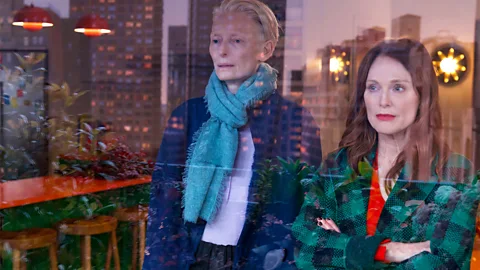The Room Next Door: Julianne Moore and Tilda Swinton are 'dazzling' in Almodóvar's first English-language feature film
 El Deseo, photo by Iglesias Más
El Deseo, photo by Iglesias MásThe legendary Spanish director has taken his signature style to the US for this "sweetly heartfelt reflection on ageing and dying" featuring two knockout performances.
After four-and-a-half decades of making rapturously acclaimed Spanish-language films, Pedro Almodóvar has written and directed his first ever feature-length film in English. And he could hardly have chosen two better actors to be in it. Adapted from a novel by Sigrid Nunez, The Room Next Door stars Julianne Moore and Tilda Swinton, both of whom are dazzling, even by their own brilliant standards.
Their characters are Ingrid (Moore) and Martha (Swinton), two old friends who were magazine journalists in New York in the 1980s. Ingrid has gone on to be an author, her latest novel being about her fear of death, while Martha has had a long career as a daredevil war reporter. They lost touch a few years earlier, but when Ingrid hears that Martha is being treated for cervical cancer in a Manhattan hospital, she rushes to her bedside, and they are soon as close as ever. They become so close, in fact, that the alarmingly pale and skeletal Martha asks Ingrid to do her a monumental favour. She has found a euthanasia pill on the dark web, but she doesn't want to be alone when she takes it. She wants Ingrid to be in the room next door.
If you've seen an Almodóvar film before, you'll be able to spot his signatures: no other director uses those deep greens, reds, yellows and blues – and few directors would dare have so many Spanish nationals cropping up at random in and around New York. Still, if you didn't know any better, you might also assume that Woody Allen was involved. Given that the film is a talky drama about cultured, comfortably well-off New Yorkers who stroll around parks discussing love, life, sex and death, it's a comparison that's impossible to avoid.
But The Room Next Door is more like one of Allen's recent films than his early or mid-period ones, in that the dialogue can be so stilted it sets your teeth on edge. When Martha mentions her estranged daughter, for instance, she says: "By puberty, she had carved out quite an abyss between us. It defined her adolescence." Almodóvar has an excuse for such verbose exposition, as English isn't his first language, but there are stretches of the film which made me wish that it was in Spanish instead.
The Room Next Door
Director: Pedro Almodóvar
Cast: Tilda Swinton, Julianne Moore, John Turturro
Run time: 1hr 50m
As it is, The Room Next Door has the air of a low-budget off-Broadway play: a two-hander that has been fleshed out only slightly for the big screen. But, again, it's a two-hander starring Moore and Swinton, and if anyone can breathe life into inert dialogue, they can. Moore is especially deft at taking phrases that would be portentous coming from anyone else, and putting so much strain and uncertainty into her voice that they sound like something a reasonable human being might way.
Even so, the stodgy first half of The Room Next Door can be tough to wade through, but it grows more and more winning after the characters leave New York behind. Martha rents an impossibly expensive, sculptural house in the mountains for a month-long "vacation", and as her last day on Earth approaches, her friendship with Ingrid becomes warmer, happier and more poignant. Meanwhile, John Turturro deepens the film’s themes as an ex-boyfriend of both women who now lectures on the horrors of the climate crisis. And Alessandro Nivola adds some jeopardy as a police detective who loathes suicide for religious reasons.
Almodóvar, now aged 74, has clearly been thinking a lot about mortality. The Room Next Door isn't a weighty philosophical work – as mature as it is, it still has glimmers of cheeky humour and campy melodrama. But it develops into a sweetly heartfelt reflection on ageing, dying, and whether or not it's healthy to find joy in the most desperate of circumstances. There aren't too many films like that in any language.
★★★★☆
--
If you liked this story, sign up for The Essential List newsletter – a handpicked selection of features, videos and can't-miss news, delivered to your inbox twice a week.
